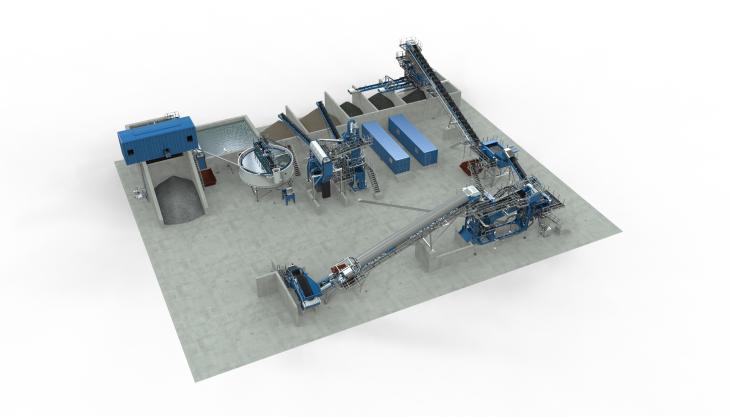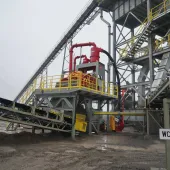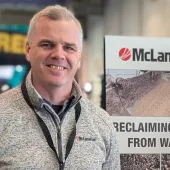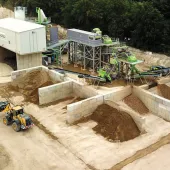New CDE recycling plant for Ace Liftaway

Hampshire waste operator firm tackles trommel fines with investment in CDE solution
ACE Liftaway have announced plans to invest in a new CDE trommel fines recycling plant for their waste-recycling and processing facility in Hampshire. The wet-processing solution – which features an integrated eddy current separator (ECS) for separating non-ferrous metals from the waste stream – will equip Ace Liftaway with the technology required to advance a circular economy in the region and its neighbouring counties.
The 90 tonnes/h plant will be located at the company’s Yokesford Hill site, home to a state-of-the-art waste-recycling and grading plant, where Ace Liftaway recycle up to 90% of all incoming dry waste streams from their business operations, producing recycled aggregates for the construction industry.
One of the industry’s most difficult materials to process, trommel fines constitute a large proportion of the remaining 10% of waste processed by Ace Liftaway and are typically sent to landfill incurring high charges for the business.
Philip Liddell, managing director of Ace Liftaway, said the company’s investment in the CDE solution will help close the loop. ‘The core of our business is skip hire services and we’re proud of the very high recycling rates we’ve achieved to date through the dry processing techniques we use at Yokesford,’ he commented.
‘However, the residual stream from this process, our trommel fines, requires a more robust approach and that’s why we’ve partnered with CDE. Trommel fines have a lot of value, and we want to try to extract that value. With this new solution we can unlock their potential to extract resources with commercial resale value while saving on landfill disposal costs. It’s worthwhile economically and environmentally.’
Trommel fines are often produced as part of the recycling process and consist of materials such as wood, aggregate, sand, glass, and organics. David Kinloch, CDE’s director of business development for the UK & Ireland, believes trommel fines contain more resource than they do waste.
‘Trommel fines are a source of significant cost for contractors, but also one of opportunity. Whether they are subject to the standard or lower-rate landfill tax they represent a business expense, that is unless they are processed effectively,’ explained Mr Kinlock ‘With CDE technology, a business can transform that cost into a fresh revenue stream through the recovery of clean sand and aggregates extracted from their trommel fines waste.’
The fibrous nature of trommel fines often makes them difficult to separate and recycle so they have traditionally been sent to landfill, delaying, rather than addressing, the problem. As they are traditionally high in lightweight, organic content – trommel fines fail to meet the specified Loss on Ignition (LOI) threshold of 10%, therefore incurring the standard, and higher landfill tax rate.
Ace Liftaway consider washing is the way forward to fully utilize trommel fines, as Mr Liddell said: ‘The future really lies in maximizing recovery from these waste streams. Wash plants like those designed and engineered for us by CDE are the future of our industry. We looked at other manufacturers, but CDE had the edge. They are leaders in this space who recognized an industry-wide problem and engineered a workable solution to address it.’
When commissioned, the new CDE recycling plant will produce a range of final products for Ace Liftaway in the secondary aggregates market, including: 0–2mm; 0–5mm; 5–10mm; 10–20mm; and +20mm sized aggregate.
A new testing regime will also be implemented to demonstrate the potential of the recovered trommel fines, whilst the integrated ECS will enable the recovery of non-ferrous metals, which will help accelerate a fast return on investment.









